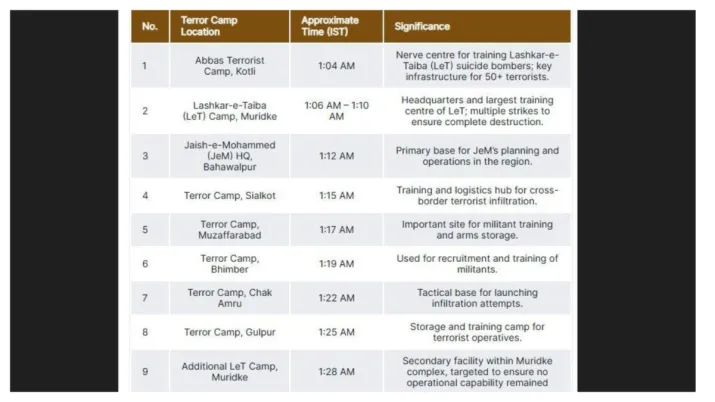Operation Sindoor, launched by Indian forces at 1:05 am on Wednesday, marked a big escalation in India’s counter-terror technique by concentrating on 9 terror camps, together with 4 in Pakistan’s Punjab province – a primary for such operations.
Indian forces launched Operation Sindoor at 1:05 am on Wednesday, hanging deep into Pakistan’s Punjab province for the first time in historical past. Not like earlier counterstrikes in 2016 (Uri) and 2019 (Balakot), which focused terrorist infrastructure in Pakistan-occupied Kashmir (PoK) and Khyber Pakhtunkhwa (KPK), this 25-minute operation struck 9 terror camps, together with 4 in Punjab, the political and navy heartland of Pakistan.
In response to Colonel Sofiya Qureshi and Wing Commander Vyomika Singh, who briefed the media on Wednesday, the strikes in Punjab had been a calculated escalation, meant to ship a decisive blow to the terror infrastructure working with impunity inside Pakistan’s core territory. One in every of these, the Markaz Subhan Allah camp in Bahawalpur district, lies almost 100 km from the worldwide border, making it one in all the deepest strikes into undisputed Pakistani territory since 1971. Regardless of this proximity to a Pakistani Military regimental heart, India has clarified that no navy installations had been focused, focusing solely on terror camps.
Targets included key terror hubs
The 4 terror camps focused in Pakistan’s Punjab had been:
- Markaz Subhan Allah – Bahawalpur district, 100 km from the worldwide border
- Markaz Taiba – Muridke, Sheikhupura district, 18 km from the worldwide border
- Mehmoona Joya – Sialkot district, 18 km from the worldwide border
- Sarjal Camp – Sialkot district, 6 km from the worldwide border

Putting deep inside Pakistan
The operation additionally destroyed 5 extra camps in Pakistan-occupied Kashmir, considerably disrupting the terror infrastructure chargeable for repeated cross-border assaults. These websites are considerably deeper inside Pakistan than the targets hit in earlier strikes. As an illustration, the 2016 Uri surgical strikes targeted on camps simply throughout the Line of Management (LoC), whereas the 2019 Balakot airstrikes focused a Jaish-e-Mohammed camp in KPK, roughly 60 km from the LoC.
Retaliation for Pahalgam assault
The strikes got here in response to the April 22 Pahalgam assault, the place Pakistani terrorists killed 26 civilians. International Secretary Vikram Misri described the bloodbath as one in all the deadliest in latest reminiscence, evaluating it to the 26/11 Mumbai assaults. “This was the largest variety of civilian casualties in a single assault since 26/11. The attackers singled out individuals primarily based on their religion, executed them in entrance of their households, and intentionally tried to incite communal unrest in Jammu and Kashmir and different elements of India. The attackers even pressured survivors to hold their message again to their communities,” he added.
Misri famous that Pakistan’s broader goal gave the impression to be to derail the return of normalcy in Kashmir, which noticed a file 23 million vacationers final 12 months. He stated the strikes had been geared toward breaking the spine of Pakistan’s terror equipment.
Casualties and affect
Over 80 terrorists had been reportedly killed in the strikes, considerably disrupting the terror networks behind the Pahalgam assault. Indian officers emphasised that the strikes had been fastidiously deliberate to keep away from civilian casualties, concentrating on solely confirmed terror hubs.
A message to Pakistan’s energy centres
Not like the earlier counter-strikes, which had been restricted to PoK or the tribal areas of Khyber-Pakhtunkhwa, Operation Sindoor struck at the coronary heart of Pakistan’s Punjab – the province that hosts a lot of the nation’s navy and political energy. “Punjab is the place the military-industrial advanced of Pakistan is deeply entrenched, together with key bases and regimental centres. Putting right here sends a transparent message about India’s resolve to answer terrorism at its supply,” a senior defence official stated.
A strategic shift in India’s retaliatory strikes
With Operation Sindoor, India has considerably expanded the geographical scope of its counterterrorism operations, signaling a brand new section in its response to cross-border terrorism. This shift showcases India’s willingness to strike at the core of Pakistan’s terror infrastructure, not simply in disputed areas, however inside Pakistan’s heartland, delivering a transparent message of deterrence.
Source link
#Operation #Sindoor #Uri #Balakot #strike #India


